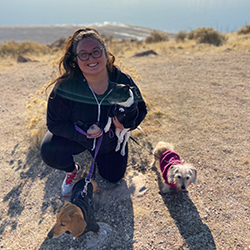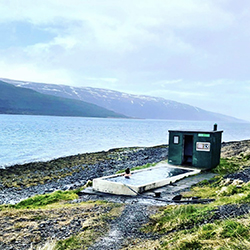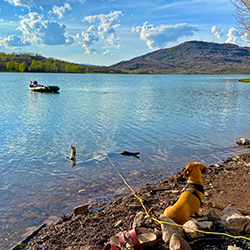Welcome, Dr. Angela Robinson!
Environmental Humanities welcomes incoming faculty member, Dr. Angela Robinson (Wito
clan of Chuuk, Micronesia) who researches within the fields of affect studies, Indigenous
studies, and performance studies. I sent Dr. Robinson a list of questions about her
academic interests, EH seminar and favorite things to do in the area; her written
responses appear below.
Welcome, Dr. Robinson! You are just appointed to the  faculty and recently completed the inaugural Pasifika-Mellon post-doctoral fellowship
in Pacific Islands Studies in Transform. Congratulations! Could you describe your
academic background and how you arrived at the University of Utah?
faculty and recently completed the inaugural Pasifika-Mellon post-doctoral fellowship
in Pacific Islands Studies in Transform. Congratulations! Could you describe your
academic background and how you arrived at the University of Utah?
Thank you! I’m so excited to be joining the faculty in Transform & Environmental Humanities. I received my PhD in Gender Studies from UCLA in 2019, and my dissertation examined how Indigenous performance in Oceania intervenes into affective colonial regimes. One of these regimes I analyzed was the discourse around climate change. When I was working on that chapter, I found myself immersed in this really exciting environmental studies research that I totally fell in love with. So much so, that I decided to shift the research for my current book project to focus primarily on climate change and how Indigenous peoples are using expansive and creative ways to address climate change impacts. When I received the Mellon-Pasifika postdoctoral fellowship, I was really excited because the University of Utah has such great programs in both Pacific Islands Studies and Environmental Humanities. So, I’m very happy to be here and really look forward to participating in this great program.
You have a joint appointment in Gender Studies in the School for Cultural and Social Transformation and Environmental Humanities in the
College of Humanities. How do you describe the connections between Environmental Humanities
and Gender Studies?
School for Cultural and Social Transformation and Environmental Humanities in the
College of Humanities. How do you describe the connections between Environmental Humanities
and Gender Studies?
A lot of Gender Studies thinks about how power operates in and through social systems & structures, such as race, gender, and sexuality. So, I think that’s a very useful frame for thinking about the environment & environmental issues, especially because Environmental Humanities allows for this kind of interdisciplinary thinking. For me, Gender Studies provides theoretical frameworks that can more clearly articulate issues of the environment & Environmental Humanities underscores really important questions necessary for thinking through structures of power. So, I very much see a productive dialogue between the two fields, and I look forward to exploring these ideas with both GS & EHUM students.
Could you tell us a little about the Issues in Environmental Humanities seminar course (EHUM 6850) you're teaching this fall?
My book project thinks about how climate change can be framed as a colonial phenomenon in the sense that it not only furthers & exacerbates colonial issues, but that it has an origin story rooted in the dualism of human vs. nature, which also happens to be a founding idea that’s undergirded many colonial projects. So, I’m interested in the ways the human has been theorized and how these ideas have impacted the environment. In this seminar, we’ll explore some of these issues by thinking through historical constructions of the human, the co-constitutive nature of this human and climate change, and what new relations might be necessary for humans under climate change.
Most of our incoming graduate students are from out of state and even out of the country. What are some of your favorite activities to do or spots you enjoy in Salt Lake or surrounding areas?
Utah is such a stunning state, and there’s so much  to explore! Some of my favorite things to do are watching the buffalo herd on Antelope Island, soaking in hidden hot springs in the winter, and boondock camping on the expansive
public lands available here. A great thing about Salt Lake City is the melding of
city life & the outdoors, so you can go out for an amazing brunch and be hiking in
the mountains ten minutes later. Some of my favorite local areas to unwind are Mueller Park, Millcreek Canyon, & Liberty Park.
to explore! Some of my favorite things to do are watching the buffalo herd on Antelope Island, soaking in hidden hot springs in the winter, and boondock camping on the expansive
public lands available here. A great thing about Salt Lake City is the melding of
city life & the outdoors, so you can go out for an amazing brunch and be hiking in
the mountains ten minutes later. Some of my favorite local areas to unwind are Mueller Park, Millcreek Canyon, & Liberty Park.
